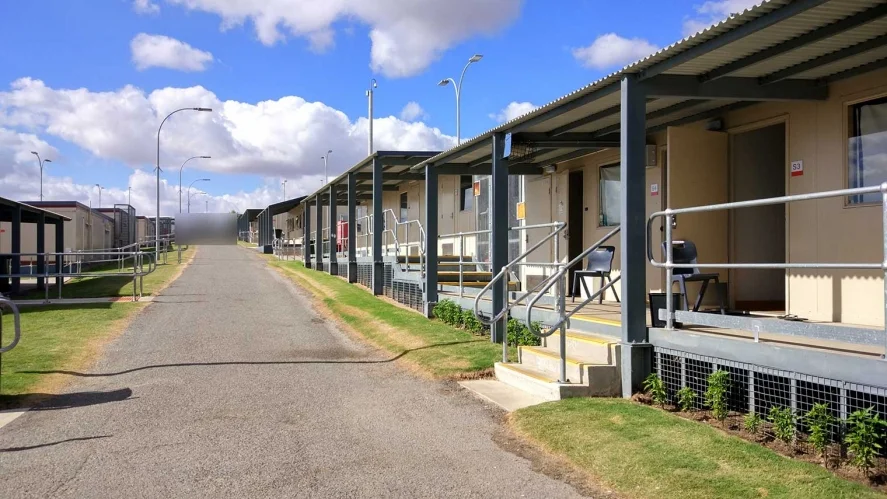
S. v Australia (HRC, 2023)
Violations: ICCPR art 12(4)
 Unremedied
Unremedied
The UN says:
HRC (2023)Pursuant to article 2(3)(a) of the Covenant, [Australia] is under an obligation to provide the author with an effective remedy. This requires it to make full reparation to individuals whose Covenant rights have been violated.
Accordingly, [Australia] is obligated, inter alia, to ensure that B. has the opportunity to re-enter Australia and to provide him with adequate compensation. [Australia] is also under an obligation to take all steps necessary to prevent similar violations from occurring in the future.

Yongah Hill immigration detention centre outside Perth, Western Australia, where Mr B. appears to have spent over 3 years (image: Australian Human Rights Commission)
An Australian woman known as Ms S. submitted a communication on behalf of her husband, Mr B., who is a national of North Macedonia. Mr B. had lived in Australia as a permanent resident since 1968 from the age of 3. At the time of the submission of his communication, he had never left Australia again, but never attained Australian citizenship. He married an Australian, has 2 Australian-born sons and enjoyed close relationships with other relatives in Australia. He has no connection to North Macedonia other than his nationality. He did not speak Macedonian or Albanian nor knew of any family there.
In August 2015, following 2 prior warnings (para. 4.2), the Assistant Minister for Immigration cancelled Mr B.’s visa, owing to his ‘substantial criminal record’ (defined as a prison sentence of 12 months or more) and he was detained pending deportation to North Macedonia. Mr B. applied unsuccessfully for the reinstatement of his visa. The Assistant Minister determined that the strength, nature and duration of his ties to Australia were outweighed by the risk he posed to the Australian community.
Ms S. petitioned the UN Human Rights Committee, alleging that Australia would violate Mr B.’s right to enter his own country (article 12(4)) by forcibly removing Mr B. from Australia. Mr B. considers Australia to be his own country. Ms S. argued that the decision to deport him was unreasonable and arbitrary and that he had strong ties to Australia which were unaltered by his criminal offending.
In responding, the Minister’s main contention was that Mr B.’s removal was not arbitrary, but lawful and reasonable in the circumstances. Mr B. was aware (unlike Stefan Nystrom) that he was not an Australian citizen and had not, despite 2 warnings from the Immigration Department, sought to become naturalised as Australian. Mr B. countered that he had sought Australian citizenship, but had been told that his criminal record would make him ineligible (para. 5.3).
While the communication was still under consideration by the Committee, Australia deported Mr B. in September 2018. It provided him with 5 nights' accommodation in North Macedonia, 500 Australian dollars and an emergency passport valid for 5 days. When his wife last spoke to him, Mr B. said that "he could not cope with his situation and would prefer to be dead" (para. 7.1)
In its final views, the Committee noted that the concept of one’s ‘own country’ is not limited to the formal sense of nationality, and someone who lacks citizenship should not necessarily be considered an alien.The notion of an individual’s ‘own country’ invites consideration of such matters as long-standing residence, close personal and family ties and intention to remain, as well as the absence of such ties. Apart from his nationality, the Committee agreed that Mr B. had no meaningful connection with North Macedonia, as he had lived in Australia for over 50 years and never intended to reside elsewhere.
Australia had not indicated whether it had considered less drastic measures to achieve its aim of protecting the Australian community from harm before deciding to deport Mr B. His deportation was therefore considered to be unreasonable, as it was disproportionate to the legitimate aim of protecting the Australian community from harm.
The Committee found that Australia violated article 12(4) and should ensure that Mr B could re-enter Australia. Six (out of 18) members of the Committee jointly reached a dissenting opinion.
Australia was required to report back within 180 days. Australia does not appear to have met that deadline.
Read the full decision: S. v Australia (March 2023)